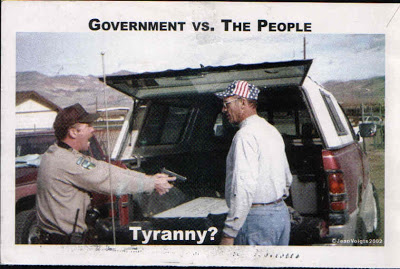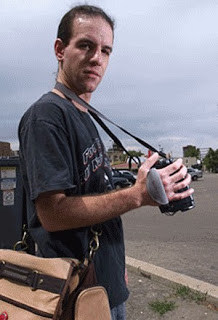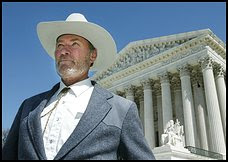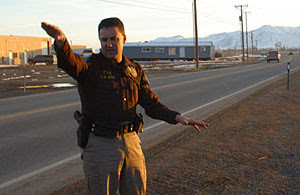When The State Owns Your Name
 Senseless, lawless violence — government reduced to its essence: BLM employee C.J. Ross commits a felonious assault on Nevada property rights activist Ken Greenwell, in Palomino Valley, Nevada, November 13, 2001. Greenwell had staged a peaceful protest of the BLM’s theft of cattle belonging to rancher Ben Colvin. Ross, acting on behalf of the rustlers, took offense. Note the contrast between Ross’s snarling, feral visage and the incredulous composure displayed by Greenwell, and ask yourself: Which of these two displays the civilized face of freedom?
Senseless, lawless violence — government reduced to its essence: BLM employee C.J. Ross commits a felonious assault on Nevada property rights activist Ken Greenwell, in Palomino Valley, Nevada, November 13, 2001. Greenwell had staged a peaceful protest of the BLM’s theft of cattle belonging to rancher Ben Colvin. Ross, acting on behalf of the rustlers, took offense. Note the contrast between Ross’s snarling, feral visage and the incredulous composure displayed by Greenwell, and ask yourself: Which of these two displays the civilized face of freedom?
Denver resident Evan Herzoff was walking home from a local tavern on April 8 of last year when he saw a swarm of police officers trying to subdue an obviously disturbed man in the parking lot of an Office Depot.

The subject, who had already injured himself, was surrounded by six officers, all of whom behaved with restraint and professionalism; for example, they took care to hold his head off the pavement in order to prevent him from further injuring himself. For Herzoff, the episode was a welcome and refreshing example of police officers rendering exemplary public service.
And then one of them, Officer Jeffrey Morgan (badge number 00102), had to ruin it.
Morgan spied Herzoff and his camera, waved and shouted a sarcastic greeting: “Hi – having a good night?” The policeman got in his car and drove off, only to return a few minutes later. The officer asked Herzoff where he lived (less than a block from the scene) and then demanded ID, claiming – dishonestly – that Herzoff was “on private property, and you don’t have any reason to be here.”
After receiving Herzoff’s driver’s license, Officer Morgan went back to the cruiser to run it through the computer. When he returned, the following exchange took place (all of it recorded by Herzoff’s video camera):
Officer Morgan: Why don’t you step into the alley so I don’t have to take you to jail?
Herzoff: No problem [starts to move into the alley]. Oh, can I have your card, by the way?
Morgan: Actually let’s take you to jail instead.
Herzoff: I’m sorry. I’m just asking for your card.
Morgan: You’re going to jail.
Herzoff was booked into the local jail, sleeping on a top bunk in a crowded cell on a completely spurious trespassing charge. His mother posted $100 bail the next morning and collected his effects, including the video camera, which recorded – among other things – the obvious disappointment of police officers as a search of Herzoff’s effects failed to find narcotics.
Officer Morgan obviously had no cause to arrest Herzoff. The 27-year-old spectator had taken care to avoid trespassing and had complied with all of the officer’s instructions. The arrest was an obvious act of petty retaliation born out of an adolescent desire on Morgan’s part assert domination over a troublesome civilian who had presumed to ask a police officer for identification.
On May 16, the City of Denver paid Herzoff a $8,500 settlement and instructed police officers not to retaliate against citizen request for ID. Neither of these acts should have been necessary, had Morgan – like most Law Enforcement Officers of recent vintage — not been trained to regard the public as an enemy to be subdued, rather than citizens to be protected.
This is particularly aggravating in Morgan’s case. He had treated the apparently deranged man with greater deference than he displayed toward a harmless, law-abiding spectator whose sole “offense” was to display, however politely, the understanding that the local police are supposed to be locally accountable.
Beneath the aggravation caused by Officer Morgan’s smug, self-satisfied abuse of power (“Actually, let’s take you to jail instead” — for that needless little bit of snarkiness, Morgan has at least one outstanding a$$-thrashing in his “accounts receivable” file) we find a telling illustration of the fact that we live in a literal police state.
Herzoff was arrested and jailed because he had politely asked a police officer for personal identification. And Herzoff would have been arrested had he refused to provide his own ID when the officer demanded it, since Colorado, like more than twenty states, has a law defining “failure to identify” as a crime.
One of the most salient traits of a police state is the demand “Papiere bitte“– “Your papers, please” — coupled with the understanding that failure to comply is good and sufficient cause for detention.
Three years ago, in the case Hiibel v. Sixth Judicial District Court of Nevada, the US Supreme Court upheld the constitutionality of state laws authorizing police to detain people who refuse to identify themselves even when there are no other grounds for an arrest.
That decision, observes legal analyst Barbara Babcock (no, not that Barbara Babcock), represents a grave point of transition for our society. No longer do Americans enjoy “our much-vaunted liberty to walk freely on the streets surrounded by a zone of privacy or even anonymity – not numbered and in place; not responsible to explain ourselves on demand to the government.”
Our freedom of movement now may be constricted at any time by anyone wearing the State-issued official costume and junk jewelry, and we can be incarcerated merely for insisting on the sovereign right to mind our own business. That is a tidy description of a police state – however relatively prosperous or apparently benign it may be.
“A police officer does not need probable cause to stop a car or a pedestrian and investigate potential crime,” writes Jeff Bray, Senior Legal Advisor to the Plano, Texas Police Department, in the May issue of Police Chief magazine.
“According to the US Supreme Court, a police officer may initiate a temporary stop, a level of intrusion short of an arrest, if the officer can articulate a reasonable suspicion that the suspect has committed a crime or is about to commit a crime,” writes Bray. “This is commonly known as a Terry stop” — after the 1968 decision Terry v. Ohio, which grudgingly allowed police to conduct “stop and frisk”-operations in the course of investigating a suspected crime.
The Hiibel ruling, however, expanded “stop and frisk” to include a police power to interrogate people at whim.
The High Court ruling notes that the plaintiff, Nevada resident Larry Dudley Hiibel, “was arrested and convicted for refusing to identify himself” to Humboldt Deputy Sheriff Lee Dove. Hiibel had been riding in his pickup truck with his 17-year-old daughter Mimi while the two of them argued over the relative merits of Mimi’s boyfriend (at the time, Mimi was the driver). At one point, Mimi in frustration slugged her dad in the shoulder, an act that was witnessed and reported to the police by an excessively zealous citizen.
Hiibel had pulled the truck over to the side of the road and was smoking a cigarette when Deputy Dove arrived. Hiibel was grouchy and uncooperative when Dove demanded that he identify himself, and tauntingly invited the Deputy to run him in. Mockery isn’t helpful when dealing with a law enforcement officer, but it isn’t a crime.
“You’re facing arrest here if I don’t see some identification,” Dove informed Hiibel after the latter had repeatedly refused to show ID. In response to Hiibel’s demand to know why an ID had to be shown, Dove replied he was “investigating an investigation” — a prompt, if less than illuminating, reply.
The video and transcript of the Hiibel arrest document – among other things – the fact that Mimi, the supposed victim, screamed in horror as her father was handcuffed and taken into custody: She was pinned in the cab of the truck by a State Trooper who had arrived to provide “backup.” Then it was Mimi’s turn to be thrown to the ground and pinned down by two large adult men, and handcuffed on the utterly preposterous charge of “resisting arrest” — her resistance in this case confined to expressing disapproval of her father’s arrest.
The “resisting arrest” charge against Mimi was dismissed, because the arresting officers couldn’t specify an underlying criminal charge to justify the arrest. (It is not unheard of, however, for people to be arrested solely for “resisting arrest”; go here and scroll down to read about the case of a 43-year-old man who was incarcerated on $15,000 bond for the non-crime of “resisting arrest without violence.”) Hiibel was convicted of his supposed crime, however, despite the fact that he had been charged with no other offense.
The purpose of the Nevada statute, observed the Washington Post, was “to codify the Supreme Court’s 1968 decision in Terry v. Ohio,” which “empowered police to briefly detain suspicious subjects – such as people who seem to be `casing’ a bank in preparation for a robbery – question them and search them for weapons.”
But as Justice Stevens noted in his Hiibel dissent, the Court in that case actually expanded police powers in a dramatic and troubling fashion.
“Given our statements to the effect that citizens are not required to respond to police officers’ questions during a Terry stop, it is no surprise that [Hiibel] assumed … that he had a right not to disclose his identity,” wrote Stevens. “The officer in this case told [Hiibel] … that `he was conducting an investigation and needed to see some identification.’ As the target of that investigation … [Hiibel] acted well within his rights when he opted to stand mute.”
The freedom to “stand mute” when faced with an official demand for ID no longer exists in much of the United States, and we can rest assured that those who are putting the final decorative touches on our Homeland Security State are working quietly to abolish it altogether.
Be sure to pay a visit to The Right Source.
Content retrieved from: http://freedominourtime.blogspot.com/2007/05/when-state-owns-your-name.html.





